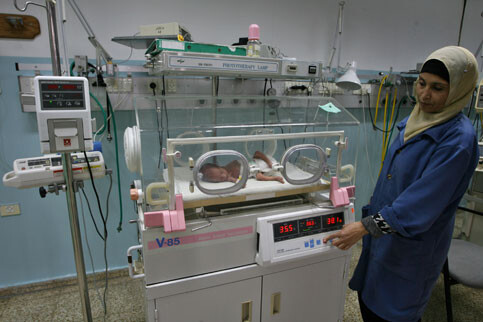Palestinian Center for Human Rights 21 January 2008

A premature baby at Gaza City’s al-Shifa hospital, where operations are threatened by an Israel-imposed fuel crisis, 20 January 2008. (Wissam Nassar/MaanImages)
At approximately 8:00pm on Sunday, 20 January, the Gaza Strip power plant ran out of fuel and shut down, plunging the Gaza Strip into darkness. The closure of the Gaza power plant, in addition to Israel’s continued, tightened siege on the Gaza Strip, will have a catastrophic effect on the 1.5 million residents of Gaza, who are already suffering chronic shortages of fuel, medicine and some basic food stuffs. The director of Gaza’s main hospital, al-Shifa, describes the current situation as “potentially disastrous.”
Israel is manufacturing a catastrophic humanitarian crisis in the Gaza Strip that is seriously deteriorating every aspect of civilian life. To date, 45 patients have died as a direct result of Israeli Occupying Force (IOF) closure and siege of the Gaza Strip. According to the Director of al-Shifa Hospital Dr. Hassan Khalaf, patients’ lives continue to be at stake, including the lives of 30 premature babies in al-Shifa Hospital, who will die immediately if there is a power cut at the hospital. Gaza’s second major hospital, the European Hospital in Khan Yunis in the southern Gaza Strip, has now suspended all major surgical operations.
Meanwhile, all crossings from Gaza to the outside world remain sealed to Palestinians.
The Gaza Strip requires 230-250 megawatts of electricity a day to operate at full capacity. On Friday, 18 January, and again on Sunday, 20 January, the IOF prevented a vital daily delivery of fuel from passing through the Nahal Oz Crossing, including industrial diesel used to fuel the power plant. The power plant is now completely closed. This closure of Gaza’s only power plant has drastically reduced electricity output across the Gaza Strip by 65 megawatts. Civilians across Gaza City and the central Gaza Strip are totally dependent on the power plant. The closure of the power plant will severely impact civilian lives across the Gaza Strip.
In addition to the dangerous shortage of electricity that threatens the lives of critically ill patients in all of Gaza’s’ hospitals, chronic shortages of petrol and diesel and gas for domestic use have led to panic buying before gas stations in Gaza are forced to close completely. Civilians are also suffering widespread shortages of bread, due to lack of electricity to power the ovens at bakeries across Gaza.
PCHR condemns the catastrophic humanitarian crisis that is being manufactured by the IOF as collective punishment to the entire population of the Gaza Strip, and calls upon the international community to put immediate pressure on the government of Israel to avert a humanitarian catastrophe in the Gaza Strip. The Centre appeals to the international community to act upon their legal and moral responsibilities to ensure the basic human rights of the citizens of the Gaza Strip are protected.
The Centre reiterates that Palestinian civilians are protected from collective punishment under international human rights law, and international humanitarian law, including the Fourth Geneva Convention.
PCHR calls upon the High Contracting Parties to the Fourth Geneva Convention to fulfill their legal and moral obligations under Article 1 of the Convention and ensure Israel’s respect for the Convention in the Occupied Palestinian Territory. PCHR believes that the conspiracy of silence practiced by the international community has encouraged Israel to act as if it is above the law and encourages Israel to violate international human rights and humanitarian law.
Related Links